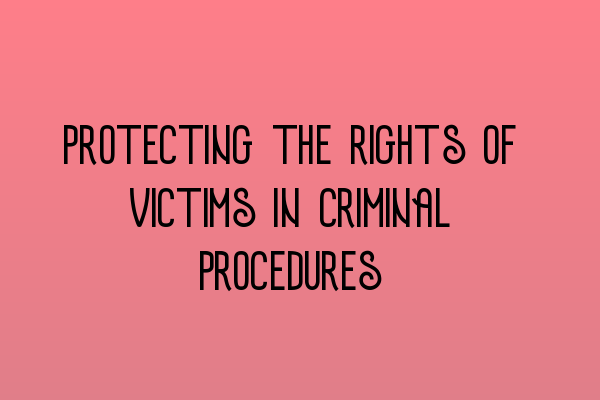Protecting the rights of victims in criminal procedures
Criminal procedures are designed to address criminal offenses and ensure justice is served. While much attention is often placed on the accused and their rights, it is equally important to protect the rights of victims throughout the process. In this article, we will explore the significance of safeguarding the rights of victims in criminal procedures.
The role of victims in criminal cases
Victims play a crucial role in criminal cases as they are directly affected by the offenses committed against them. It is not only essential to provide support and assistance to victims but also to ensure they feel empowered and heard during the legal proceedings. By protecting their rights, we enhance the integrity of the criminal justice system and promote a fair and just society.
Right to be informed
One of the fundamental rights of a victim is the right to be informed. This includes being kept up to date about the progress of their case, important court dates, and any potential decisions or outcomes. It is important for victims to understand their rights so they can actively participate in the legal process and make informed decisions.
If you are interested in knowing more about the SQE exam, check out our related article on SRA SQE Exam Dates.
Right to be heard
Victims have the right to be heard in court and express their opinions, concerns, and the impact the crime has had on their lives. This can be done through victim impact statements or testifying as a witness. By allowing victims to share their experiences, it not only humanizes the legal process but also helps judges and juries gain a deeper understanding of the consequences of the crime.
Right to protection
Victims have the right to protection, both during the legal proceedings and in their daily lives. This includes measures such as restraining orders, witness protection programs, and ensuring their privacy is respected. The aim is to prevent further harm or intimidation and to provide a sense of security to the victims and their families.
Right to restitution
Victims may be entitled to restitution, which involves receiving compensation for the losses or damages they have suffered as a result of the crime. This can include medical expenses, property damage, and even emotional distress. By providing victims with the opportunity to seek restitution, it acknowledges their financial and emotional struggles and helps them recover from the aftermath of the crime.
Conclusion
Protecting the rights of victims in criminal procedures is paramount to ensuring justice is served and providing support to those who have suffered. By upholding victims’ rights, we establish a fair and balanced legal system that considers the interests and well-being of all parties involved. If you want to strengthen your knowledge of criminal law and practice, check out our SQE 1 and SQE 2 preparation courses.
For additional practice resources, you can also explore our articles on SQE 1 Practice Exam Questions and SQE 1 Practice Mocks FLK1 FLK2.
Thank you for reading! Feel free to reach out to us at SQE Criminal Law & Practice Law UK for any legal inquiries or assistance you may need.
